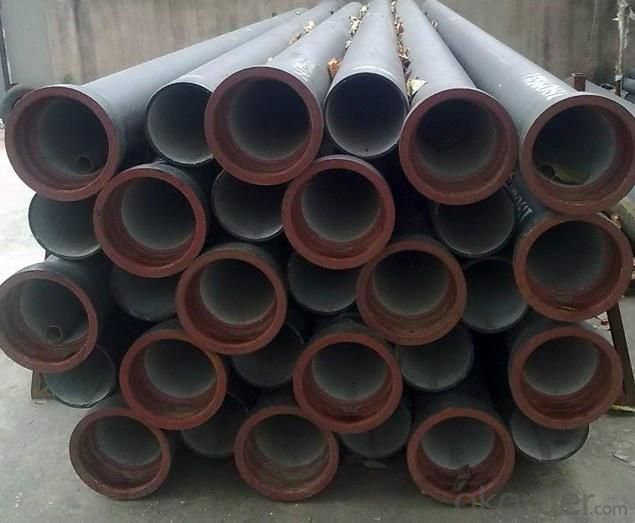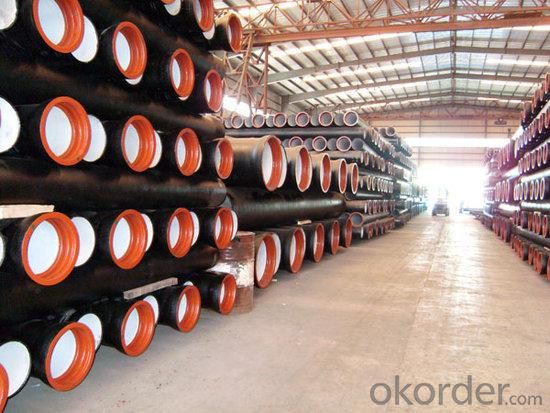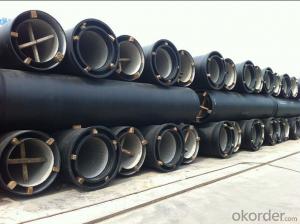Ductile Iron Pipe EN545 C30 Class68 DN600
- Loading Port:
- China main port
- Payment Terms:
- TT OR LC
- Min Order Qty:
- 500 m
- Supply Capability:
- 5000 m/month
OKorder Service Pledge
OKorder Financial Service
You Might Also Like
1,Ductile Iron Pipe Description :
1) Pipes confirm to ISO2531,K9 class,T type joint,6m long,with inside cements lining conform to ISO4179, outside Zinc spraying(130g/m2) and bitumen coating(70μm) conform to ISO8179.
2) Pipe ends: Spigot and socket ends, with 100% SBR rubber gaskets accoding to ISO4633
3) we can do third party inspection according to customer's request.
4) Our products have been sold to many international market,such as Middle East and South East Asia and Africa.
2,Main Features of the Ductile Iron Pipe:
•High yield strength
•High tensile Strength
•High corrosion resistance
1. Internal Lining: Cement, conform to ISO4179
2. External coating: Zinc + Bitumen, conform to ISO8179
3. Rubber: NBR, SBR, EPDM according to ISO4633 / EN681.1
4. Note: The gaskets, bolts & nuts are supplied respectively as your special requirement
3,Ductile Iron Pipe Images:


4. Ductile Iron Pipe Specification
Standard: API SPEC 5L 44th eidtion,ASTM A252-98(2007)
Grade: A53 Grades A/B, ASTM A106 Grades B/C,ASTM A179
AWWA, C200, ASTM A139, ASTM A120, API 5L Grade B
X42, X52, X56, X60, X65, X70, X80, X100
Weld Alternatives: LSAW
OD size range: 6.4~44.5mm
Wall thickness: 406.4~1422mm
Length: 3 - 12 m according to requirment
Note: Other grade can also be provided after consulting. Special design are available
for coal slurry conveyance LSAW line tube -- Service
5.FAQ:
We have organized several common questions for our clients,may help you sincerely:
1.Q: Why would you choose ductile iron pipe rather than other pipe materials?
A:The reasons are obvious for that not only ductile iron pipe possesses the inherent strength and flexibility of ductile iron, combined with proven corrosion protection systems, but also the cost savings can be achieved from design to installation and commissioning.
2.Q:Why can you guarantee the inner of pipes can’t be corroded?
A: High alumina cement mortar lining and sulphate-resistant cement mortar lining. These two special linings are applicable to inner anti-corrosion for sewage pipes, improving resistance to erosion of the sewage components.
- Q:How can stainless steel pipes and ductile iron pipes be joined?
- Or with a gland type expansion joint, by tightening the pressure plate bolts, sealing pipe fittings and pipe wall, so as to achieve sealing, while retractable function
- Q:Can ductile iron pipes be used for oil and gas pipelines?
- Yes, ductile iron pipes can be used for oil and gas pipelines. Ductile iron is known for its durability, strength, and corrosion resistance, making it suitable for transporting oil and gas. Its high tensile strength and ability to withstand pressure and extreme temperatures make it a reliable choice for these applications.
- Q:Are ductile iron pipes suitable for use in agricultural applications?
- Yes, ductile iron pipes are suitable for use in agricultural applications. They are known for their durability, strength, and resistance to corrosion, making them ideal for transporting water, sewage, and irrigation systems commonly found in agriculture. Additionally, ductile iron pipes have a long lifespan and can withstand high pressure, making them a reliable choice for agricultural applications.
- Q:Can ductile iron pipe be used for chemical processing plant applications?
- Yes, ductile iron pipe can be used for chemical processing plant applications. It is durable, corrosion-resistant, and has high tensile strength, making it suitable for transporting various chemicals and fluids in such environments. Additionally, its flexibility and ease of installation make it a practical choice for piping systems in chemical processing plants.
- Q:How are ductile iron pipes different from cast iron pipes?
- Ductile iron pipes are different from cast iron pipes in terms of their composition and properties. Ductile iron pipes are made from a type of cast iron that has been treated with magnesium to improve its strength and flexibility. This makes ductile iron pipes more durable, impact-resistant, and less prone to cracking or breaking compared to traditional cast iron pipes. Additionally, ductile iron pipes have a higher tensile strength, allowing them to withstand higher internal and external pressures. In summary, ductile iron pipes are a more modern and advanced version of cast iron pipes, offering improved performance and longevity.
- Q:Can ductile iron pipe be used for industrial process piping?
- Indeed, industrial process piping can make use of ductile iron pipe. Renowned for its robustness, longevity, and ability to withstand corrosion, ductile iron pipe proves itself as an appropriate selection for diverse industrial functions. It boasts the capability to manage high-pressure systems and commonly finds application in sectors like water and wastewater treatment, oil and gas, chemical processing, and power generation. Moreover, ductile iron pipe offers ease of installation and an extensive lifespan, thus rendering it a cost-efficient choice for industrial process piping.
- Q:What is the expected service life of ductile iron pipe?
- The service life of ductile iron pipe can vary depending on several factors, including the environment, soil conditions, water quality, and the implementation of maintenance and corrosion protection measures. On average, ductile iron pipe is designed to last between 75 and 100 years, thanks to its exceptional strength, durability, and resistance to corrosion. This type of pipe is renowned for its ability to withstand harsh conditions, making it a popular choice for water and wastewater systems, industrial applications, and various infrastructure projects. By regularly maintaining and properly protecting against corrosion, the service life of ductile iron pipe can be extended, ensuring its reliability and performance for many decades to come.
- Q:How to analyze and judge the quality of ductile iron pipe
- The most intuitive judgment ductile pipe quality is the ratio of the thickness of cement and iron, cement thick wall thicker tube quality is better, there are also some manufacturers of the pipe, thick wall pipe head cast iron part looks to be thick, but there is also a thin iron pipe, so the judge quality to open look inside, personally think that the highest price of the manufacturer is Jinan steel, Jinan Iron and steel because the pipe quality can reach the national standard K9, the price is also lower than the emerging, Saint Gobain and other major brands, as the water supply pipe K8 is no problem, but the price and quality aspects for the construction of which more importance.
- Q:How are ductile iron pipes protected against external soil loads?
- Ductile iron pipes are protected against external soil loads through several methods. One of the primary methods is the use of a protective coating on the exterior surface of the pipe. This coating acts as a barrier between the iron pipe and the surrounding soil, preventing direct contact and reducing the risk of corrosion. Another method of protection is the use of trench backfill materials. The soil used for backfilling is carefully selected and compacted to provide adequate support and load distribution for the pipe. This helps to minimize the stress and pressure exerted on the pipe by the surrounding soil. Additionally, the design and installation of the pipe system play a crucial role in protecting ductile iron pipes against external soil loads. The pipes are typically laid in a properly engineered trench, which includes appropriate bedding and backfilling techniques to ensure stability and minimize the potential for damage. Furthermore, the use of proper pipe jointing techniques is essential for protecting against external soil loads. Joints are often designed to be flexible, allowing for some movement and accommodating external loads. This helps to distribute the stress along the length of the pipe and prevents concentrated pressure points that could lead to failure. Overall, a combination of protective coatings, appropriate backfill materials, proper installation techniques, and joint design contribute to the effective protection of ductile iron pipes against external soil loads. This ensures the longevity and reliability of the pipe system, even in challenging soil conditions.
- Q:Some questions about the bearing capacity of nodular cast iron pipes!
- The minimum tensile strength of ductile iron is 400MPa, and the stresses can be calculated according to the wall thickness, diameter and safety factor.
1. Manufacturer Overview |
|
|---|---|
| Location | |
| Year Established | |
| Annual Output Value | |
| Main Markets | |
| Company Certifications | |
2. Manufacturer Certificates |
|
|---|---|
| a) Certification Name | |
| Range | |
| Reference | |
| Validity Period | |
3. Manufacturer Capability |
|
|---|---|
| a)Trade Capacity | |
| Nearest Port | |
| Export Percentage | |
| No.of Employees in Trade Department | |
| Language Spoken: | |
| b)Factory Information | |
| Factory Size: | |
| No. of Production Lines | |
| Contract Manufacturing | |
| Product Price Range | |
Send your message to us
Ductile Iron Pipe EN545 C30 Class68 DN600
- Loading Port:
- China main port
- Payment Terms:
- TT OR LC
- Min Order Qty:
- 500 m
- Supply Capability:
- 5000 m/month
OKorder Service Pledge
OKorder Financial Service
Similar products
New products
Hot products
Related keywords



























